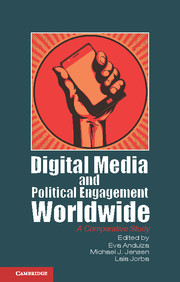
- Publisher:
- Cambridge University Press
- Online publication date:
- July 2012
- Print publication year:
- 2012
- Online ISBN:
- 9781139108881


This book focuses on the impact of digital media use for political engagement across varied geographic and political contexts, using a diversity of methodological approaches and datasets. The book addresses an important gap in the contemporary literature on digital politics, identifying context dependent and transcendent political consequences of digital media use. While the majority of the empirical work in this field has been based on studies from the United States and United Kingdom, this volume seeks to place those results into comparative relief with other regions of the world. It moves debates in this field of study forward by identifying system-level attributes that shape digital political engagement across a wide variety of contexts. The evidence analyzed across the fifteen cases considered in the book suggests that engagement with digital environments influences users' political orientations and that contextual features play a significant role in shaping digital politics.
“The strength of this impressive volume lies in its exploration of online politics beyond the well-researched U.S. and UK examples. The authors make a sophisticated and compelling case for the importance of culture and context as shapers of technological effects." —Stephen Coleman, Professor of Political Communication, University of Leeds
“Understanding how digital media are affecting the dynamics of citizens’ engagement has become the holy grail of political communication research. Bringing together research conducted by nineteen international scholars in fifteen different countries, Digital Media and Political Engagement Worldwide brings us closer to this goal by comparatively exploring the variety of pathways through which digital media influence political engagement; who is most likely to engage politics through digital media and how this choice results from the interaction of individual characteristics and differences in the nature of online and offline politics; and the sociopolitical contexts in which digital politics occurs.” —Michael X. Delli Carpini, Walter H. Annenberg Dean of the Annenberg Schoolfor Communication, University of Pennsylvania
“This book is a major new study that provides one of the most comprehensive answers to date to the question of how digital media is affecting political engagement. Its depth and breadth of coverage is unique and striking in that it brings together highly sophisticated empirical analyses of Internet use and participation across a range of democratic and non-democratic contexts. From single case studies to multi-country analyses, the consistently positive findings that are reported mark an important step forward in the literature in terms of addressing ongoing debates about whether the Internet is good or bad for democracy. Looking to the future, the book also offers powerful insights into future trends by calling for researchers to consider online participation as a multidimensional phenomenon that is pushing forms of political engagement into a new, more social, horizontal, and expressive space.” — Rachel Gibson, The University of Manchester
 Loading metrics...
Loading metrics...
* Views captured on Cambridge Core between #date#. This data will be updated every 24 hours.
Usage data cannot currently be displayed.